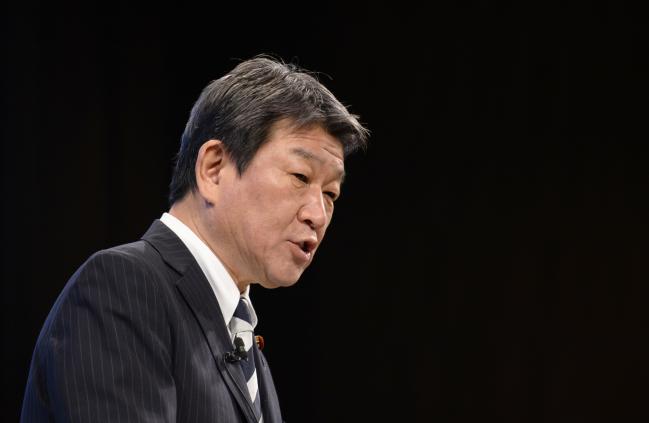(Bloomberg) -- Japanese Economy Minister Toshimitsu Motegi said U.S. Trade Representative Robert Lighthizer had assured him Washington won’t seek restrictions on auto exports -- a nearly $50 billion trade sector that could cloud a state visit next week by President Donald Trump.
Motegi told a press conference in Tokyo on Friday he contacted his counterpart after Bloomberg reported on a draft executive order that people familiar with the matter said Trump is expected to sign this week. Under the proposed deal, the U.S. would give the EU and Japan 180 days to agree to limit auto imports into the U.S. in return for delaying new auto tariffs.
“Japan opposes any measure that distorts free and fair trade,” Motegi told reporters. “We checked with the U.S. side again and they said they were not planning to seek such measures.”
Japan reluctantly agreed last September to begin bilateral talks with the U.S. after being threatened with punitive tariffs on its lucrative car exports, which form a large proportion of its trade surplus. Lighthizer has told U.S. lawmakers the talks were a matter of urgency because U.S. farmers risk losing market share to Pacific and European nations that have already sealed trade deals with Asia’s second-largest economy.
In a September joint statement, the two countries agreed not to take any actions against the spirit of the agreement while talks were in progress. The first round was held last month.
Motegi drew a distinction between import restrictions, such as tariffs, and export restrictions such as quotas, to which he said Japan was particularly opposed.
‘Tough One’
“If the U.S. urges Japan to apply such export restraints in a voluntary manner, Japan may not accept that,” said Junji Nakagawa, a professor at Chuogakuin University in Chiba, near Tokyo. “Or Japan should not accept that. If the U.S. persistently urges that point, then maybe the negotiation will be a very tough one.” He added that such restrictions can be seen as a violation of World Trade Organization rules.
According to the executive order, the U.S. administration has determined that imports of cars into the U.S. present a threat to national security because they have hurt domestic producers and their ability to invest in new technologies.
Trump, who has frequently criticized Japan for what he calls “unfair” trade, is set to become the first foreign leader to meet Japan’s new Emperor Naruhito during a state visit running from May 25-28.
